Why Do Some People Crave Seaweed When Pregnant?
One of the hallmark signs of pregnancy is the development of food cravings. Among the most common pregnancy cravings are pickles, ice cream, and salty junk food. But some pregnancy cravings go beyond typical fridge and pantry staples. Cosmopolitan compiled a list of wacky pregnancy cravings including margarita mix, lime juice, sauerkraut pizza, and even sand. In fact, some expectant mothers develop pica, a condition that triggers cravings for non-food items like dirt and soap, according to The Bump.
Thankfully, the majority of pregnant people don't experience pica, instead sticking to food-based cravings. Besides the standard pickles and potato chips, many may also notice a pregnancy craving for seaweed. These cravings may be for sushi wrapped in seaweed, roasted nori snacks, wakame soup, or a number of other foods containing sea veggies.
If you're pregnant and dying to eat seaweed every day, your body might be trying to send you an important message about your health.
Here's why you're craving seaweed when pregnant
According to GoodtoKnow, many pregnancy cravings are related to dietary deficiencies, and seaweed is no exception. The three types of edible seaweed — green, red, and especially brown seaweed — all contain high levels of iodine. The National Institutes of Health note that iodine is a mineral needed to make thyroid hormones, which play a crucial role in a variety of systems in the body. They also say that iodine is especially important for infants and pregnant women. Craving seaweed could be a sign that your body and growing bundle of joy aren't getting enough of this essential mineral.
Another deficiency that could be linked to seaweed cravings is sodium deficiency. Many types of seaweed have a naturally salty flavor, while others contain added salt (via Time). Either way, these sea plants could hit the spot for pregnant women lacking sodium in their diets. HuffPost explains that it's common to crave salty foods to maintain fluid balance, blood pressure, and other bodily functions while pregnant — all of which sodium is required.
Seaweed offers pregnancy health benefits
Besides boosting iodine and sodium levels, there are other notable benefits of eating seaweed during pregnancy. According to Medical News Today, many types of seaweed are packed with iron, vitamin C, vitamin B, and vitamin A. Sea plants can also be a good source of protein, polyunsaturated fatty acids, and antioxidants. According to The American College of Obstetricians and Gynecologists, getting enough of these nutrients is necessary for proper fetal growth and development.
Additionally, Self says that seaweed is a great source of soluble fiber, which aids in digestion. Fiber can also help control appetite, and while there's generally no need to restrict calories while pregnant, the fiber in seaweed could at least help keep overzealous pregnancy cravings at bay.
Some parents-to-be may worry that seaweed contains mercury, which is often found in seafood. Too much mercury could have adverse effects on your baby's brain and nervous system (per Mayo Clinic). Thankfully, the blog Pregnancy Food Checker assures that seaweed is generally safe and doesn't contain enough mercury to harm your growing baby. So go ahead, and get snacking on those nori chips.


